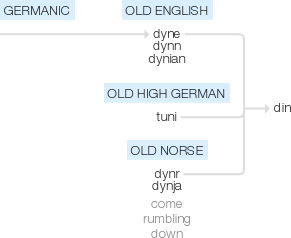Din
Old English dyne, dynn (noun), dynian (verb), of Germanic origin; related to Old High German tuni (noun) and Old Norse dynr (noun), dynja ‘come rumbling down’.
wiktionary
From Middle English dynne, dyne, dyn, from Old English dyne, from Proto-West Germanic *duni, from Proto-Germanic *duniz, from Proto-Indo-European*dʰún-is, from *dʰwen-(“to make a noise”).
Cognate with Sanskrit धुनि(dhúni, “sounding”), ध्वनति(dhvánati, “to make a noise, to roar”), Old Norse dynr, Norwegian Nynorsk dynja.
From Middle English dynnen, from Old English dynnan, from Proto-Germanic *dunjaną, from Proto-Indo-European *dʰwen-(“to make a noise”).
din ( uncountable)
etymonline
din (n.)
"loud noise of some duration, a resonant sound long continued," Old English dyne (n.), related to dynian (v.), from Proto-Germanic *duniz (source also of Old Norse dynr, Danish don, Middle Low German don "noise"), from PIE root *dwen- "to make noise" (source also of Sanskrit dhuni "roaring, a torrent").
